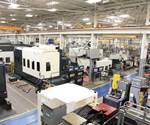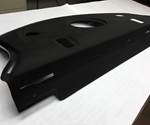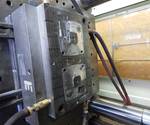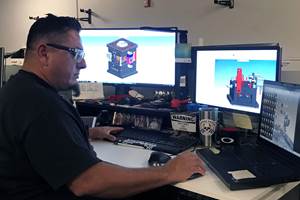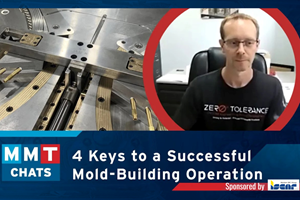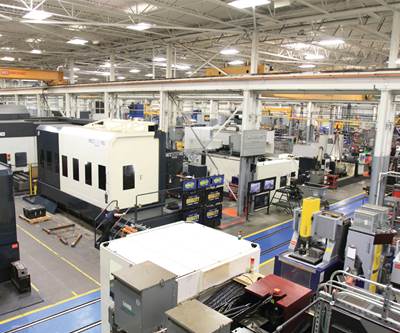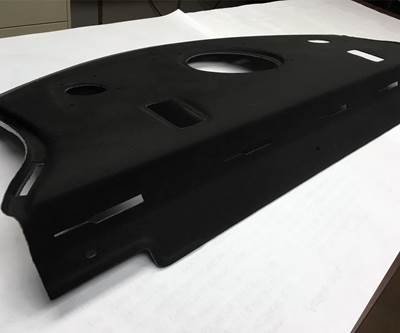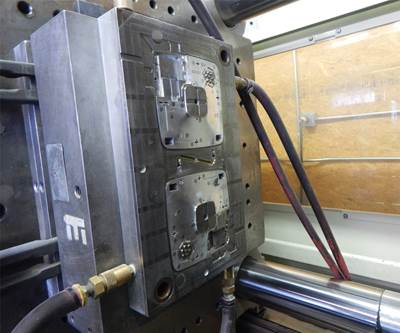Prodigy Mold & Tool Inc.
This Indiana shop specializes in "mission-critical" molds.
Prodigy specializes in “mission-critical” molds. Explain what that means.
Darrin Schmitt, President: Mission-critical molds are those that are dependent on their quality and accuracy to deliver consistent parts that people depend on to ensure their safety. For example, molds we build for gears and gear housings are considered mission-critical because those gears and housings are used in a multitude of automotive products that, directly or indirectly, affect a driver’s safe operation of a vehicle. Prodigy has been building these types of molds for more than 20 years; however, expertise in this area doesn’t come overnight. It takes a real team effort to satisfy customers who expect perfection for these types of parts.
Explain the differences between gears and gear housings, especially in the way you approach building molds for them.
Prodigy: They are quite different from each other in that gears and worms are more precise, with emphasis not only on consumer safety but comfort as well. They are used for many types of functions, including adjusting seats, steering mechanisms, throttle bodies, mirrors and doors in the automotive industry, as well as various actions needed in medical products, outdoor equipment and so on. Our customers expect all critical-part geometry to be within 0.02 mm. This means steel needs to be machined within 0.0002 to 0.0003 inch to make them “capable.”
Gear housings are just as precise as gears and worms in the end, but require a multitude of adjustments and “grooming” (machining) because of the unsymmetrical and unusually thick sections of plastic material needed to secure the internal gear/worm components when assembled. These thick sections are typically extra warpage producers, so it’s kind of like machining a football shape in order to end up with a basketball. We intentionally leave steel “steel safe” and gradually sneak up on it. Every time we remove steel, grooming it affects the shrink/warp differently than the previous time. It’s challenging and fun stuff. Because of the complex nature of this work, getting approval on a housing tool is generally at least a year-long process. It’s not uncommon for us to go through several rounds, sometimes as many as eight, of grooming, then re-sampling the housing tool at the customer’s facility, inspecting the parts, and then shipping the mold back to us to repeat that process until it’s exactly what the customer requires, which is 100 percent part-to-print compliance.
Talk about metrology and quality at Prodigy. What are your capabilities and how does it affect the way you build molds for gears and gear housings?
Prodigy: Gearing is very demanding because of the need for consistent operation for safety and the need to operate very quietly. This requires getting into tenths of thousandths in tolerances, and making unsymmetrical gear shapes to compensate for the warpage/shrinkage factor is common. Again, this is because when a part shrinks or warps, it may look like more like a football but it needs to be a basketball. I’m exaggerating, of course, to make the point. To resolve this issue, we must reverse-engineer the geometry to compensate. We manufacture in a climate-controlled environment with very good equipment, including two Okuma M560V high-speed mills, two Röders RFM 600 vertical machining centers and various Charmilles EDM machines. We also use metrology equipment, including a Sheffield Cordax CMM with PC-DMIS software from Hexagon, a Vision Engineering measurement system, as well as traditional tenth indicators. In the end, until a tool is molding parts in the press it will be making production in, you never know what you’re going to get. Prodigy also supplies the automotive industry with quality tooling to produce various parts related to safety restraint. These molds get to be very involved with multiple complex actions as well as the need to produce parts that are visually appealing.
Have you invested in any new equipment to advance your mold-building processes?
Prodigy: We’ve recently purchased an Okuma Multus 300B five-axis mill-turn center with a 60-position toolchanger. We’re now using the Multus to manufacture prototype gears from raw plastic stock instead of prototype molds to save on time and money for customers who may just need a few parts to prove out a concept. We’re also using it to manufacture mold components, small production jobs and thermoforming components. We try to use it for any project that has both turn and mill/drill requirements in a size that is feasible for this machine. It’s been a great time-saver. We use Esprit CAD/CAM for the Multus and Cimatron 13 for all our other CAD/CAM needs.
Related Content
Mold Design Review: The Complete Checklist
Gerardo (Jerry) Miranda III, former global tooling manager for Oakley sunglasses, reshares his complete mold design checklist, an essential part of the product time and cost-to-market process.
Read MoreTop 10 Topics to Cover During an ISO 9001 Manufacturing Audit
Take a look at this practical hands-on approach to conducting a quality audit.
Read MoreMaking Quick and Easy Kaizen Work for Your Shop
Within each person is unlimited creative potential to improve shop operations.
Read MoreMMT Chats: 4 Keys to a Successful Mold-Building Operation: Innovation, Transparency, Accessibility and Relationship
MoldMaking Technology Editorial Director Christina Fuges chats with Steve Michon, co-owner of Zero Tolerance in Clinton Township, Michigan, about the excitement of solving problems, the benefits of showing gratitude, the real struggle with delegation and the importance of staying on top of technology. This episode is brought to you by ISCAR with New Ideas for Machining Intelligently.
Read MoreRead Next
Concours Technologies (Formerly Concours Mold Inc.)
This conversation with the Canadian shop offers a snapshot of its operations.
Read MoreCS Tool Engineering Inc.
This Michigan shop designs and builds plastic injection and compression molds, with a specialty in compression-form and trim-mold tooling.
Read MoreInjection Mold Inc.
This shop specializes in rapid prototype molds and “quick-delivery” production molds.
Read More
